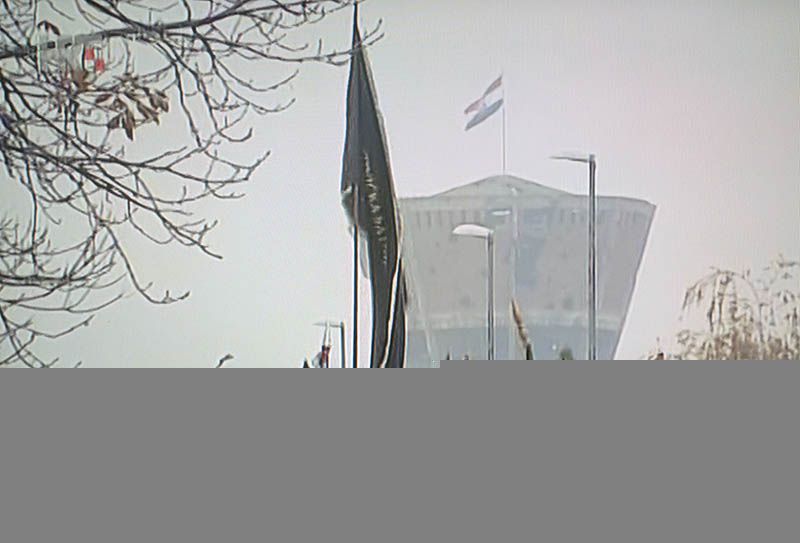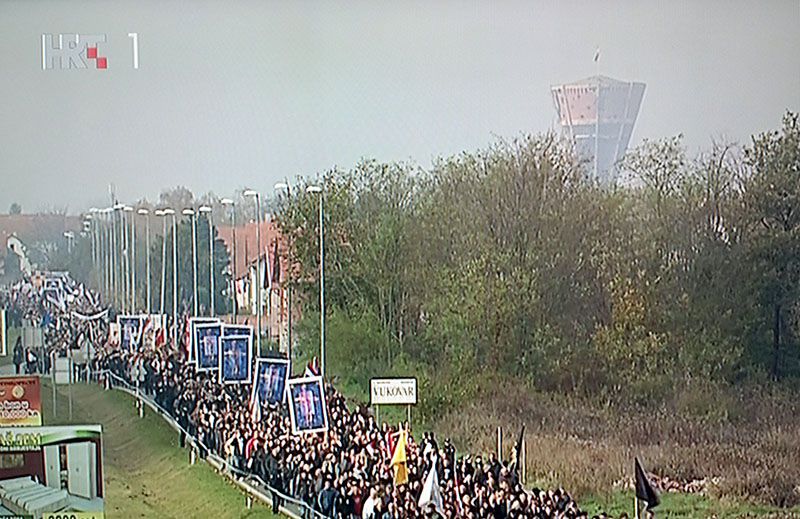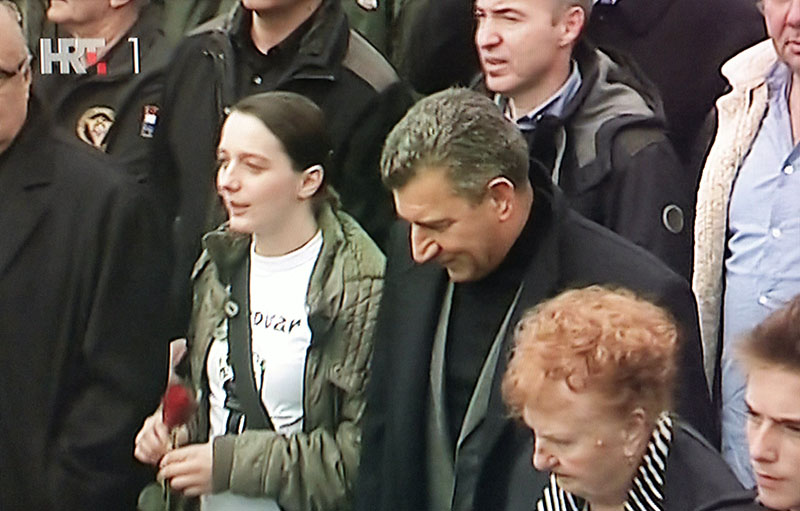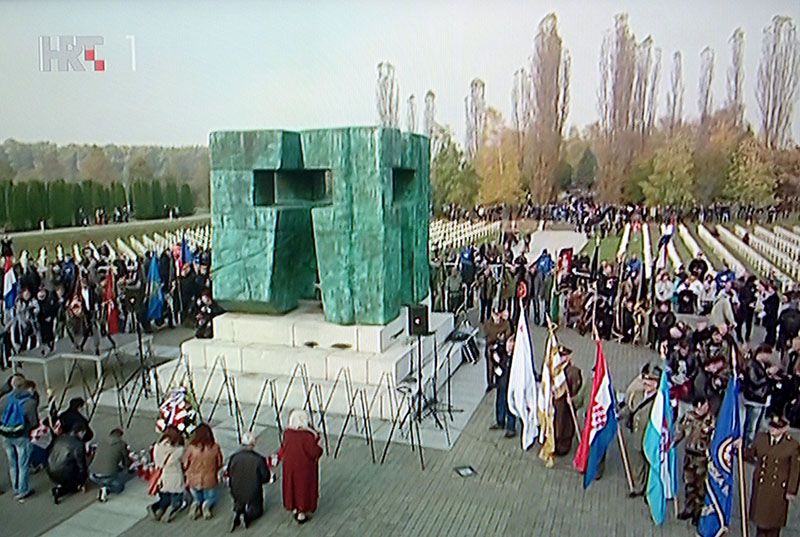Who Will Unite Vukovar Croatia with non-Vukovar Croatia?
Adelina Marini, November 19, 2013
 22 years after the fall of Vukovar, Croatia instead of united is divided into a Vukovar Croatia and a non-Vukovar Croatia. On November 18th, when the anniversary of the devastation of the city by the then Yugoslav People's Army (JNA) is marked a group of war veterans, calling themselves a Staff for Defence of Croatian Vukovar and on whose clothes was written: "Staff For Better and Fairer Croatia", blocked the column of officials to reach the military graveyard. That something was to come became clear early in the morning when the protocol was broken and a group of Vukovar citizens visited the local hospital an hour earlier than scheduled. Representatives of the Staff said that every year because of the state elite ordinary people were unable to visit the hospital and pay their respects to the wounded and killed, that was why they decided to go earlier.
22 years after the fall of Vukovar, Croatia instead of united is divided into a Vukovar Croatia and a non-Vukovar Croatia. On November 18th, when the anniversary of the devastation of the city by the then Yugoslav People's Army (JNA) is marked a group of war veterans, calling themselves a Staff for Defence of Croatian Vukovar and on whose clothes was written: "Staff For Better and Fairer Croatia", blocked the column of officials to reach the military graveyard. That something was to come became clear early in the morning when the protocol was broken and a group of Vukovar citizens visited the local hospital an hour earlier than scheduled. Representatives of the Staff said that every year because of the state elite ordinary people were unable to visit the hospital and pay their respects to the wounded and killed, that was why they decided to go earlier.
Later on, instead of a single column of people who were on their way to the graveyard, a second one detached mainly consisting of members of the Staff and their supporters. Some time later the two columns were merged. In the official column were Croatia's President Ivo Josipovic, Parliament Speaker Josip Leko, Prime Minster Zoran Milanovic and members of the government, members of parliament, diplomats, ordinary citizens from all over the country who came to pay respects to those killed during the siege and fall of Vukovar in 1991. In the other column could be seen key figures from the war - generals Ante Gotovina, Mladen Markac and Ivan Cermak, acquitted a year ago by the Hague Tribunal on the war crimes in former Yugoslavia. Until the moment when the Staff blocked their way to the military graveyard, initially with the explanation to first let the relatives of the victims and ordinary citizens pass. After half an hour waiting the three state leaders agreed to give up the ceremony of laying flowers at the graveyard. Using surrounding streets they visited Ovcara where patients from the Vukovar hospital were massacred.
Indignation, insult, political small talk
Representatives of the Staff said the state elite gave up on paying respects to the dead while all officials unanimously pointed out that they were prevented from doing it. The president said he knew there were people who wished to turn the commemoration into a political manifestation, but he hoped no politics would be made out of Vukovar. To him this year was to mark another step forward toward reconciliation and as a sign for this, he wrote on Facebook, the commemoration was attended for the first time by representatives of the Serbian People's Council and the Serbian Democratic Forum. "After today we will need a lot of strength and persistence to be able through the culture of dialogue,  reconciliation and respect for the victims to return into our society", says the president's post in the social network.
reconciliation and respect for the victims to return into our society", says the president's post in the social network.
Later in an interview with RTL television he pointed out that the commemoration did not achieve its main goal which was the unification of the nation. He expressed confidence, though, that Croatia was a stable democracy and would come successfully and even stronger out of the situation. Mr Josipovic several times underscored that Croatia was a country of tolerance, understanding and democracy. "There is no excuse for today's situation. This is a wedge which will be difficult to take out". Without naming anyone he agreed that there were political leaders in the country who were responsible for this. For the first deputy Prime Minister and Minister for Foreign and European Affairs Vesna Pusic Vukovar was a victim of political small talk. According to her, party police organised the blockade. Asked whether she meant the opposition Croatian Democratic Union (HDZ), she confirmed. Tomislav Karamarko, the party's leader, did not comment specifically on the blockade. He had no statement on the issue on Facebook as most of the other political representatives.
Media were unanimous, when covering the commemoration, that Croatia was divided. A thesis Prime Minster Milanovic denounced. "This is not a division, but kitsch", he said in an interview with the Croatian Nova TV. Unlike a large part of his cabinet he refrained from blaming his biggest political rival HDZ saying that the party was not capable of organising such a thing. Rather the political leadership of the party was simply taking advantage of already ongoing processes. Mr Milanovic also rejected the possibility a reason for this year's ruining of the marking of the anniversary to be the conflict on the introduction of bilingual inscriptions on public buildings which has been fuelling tensions ever since the beginning of the year. After several unsuccessful attempts for negotiations with the Staff, a day before November 18th a collection of signatures has been launched to initiate a referendum aimed at introducing bilingual inscriptions only where minorities have more than 50%.
 Zoran Milanovic said, though, that this was ridiculous because then they will not be minorities but majorities. "This is a good Central Asian concept", he said and firmly rejected the possibility of further talks with the members of the Staff because, he said, they were representatives of no one. He denounced the option for amendments to the law to reduce the tensions as well. The law is constitutional and is almost as old as Croatia itself, Milanovic recalled. I have always believed, he said, that on this issue we have a long-term consensus, but I see that the world views are one when HDZ is in power and another when the SDP is in power. "Well, this is impossible. The law is a law", he underlined and added that Croatia will be a rule of law state and will have high standards, yet entirely Croatian, not imported from the outside, European. Until I am a premier we will expand the space of freedom and rights, he concluded.
Zoran Milanovic said, though, that this was ridiculous because then they will not be minorities but majorities. "This is a good Central Asian concept", he said and firmly rejected the possibility of further talks with the members of the Staff because, he said, they were representatives of no one. He denounced the option for amendments to the law to reduce the tensions as well. The law is constitutional and is almost as old as Croatia itself, Milanovic recalled. I have always believed, he said, that on this issue we have a long-term consensus, but I see that the world views are one when HDZ is in power and another when the SDP is in power. "Well, this is impossible. The law is a law", he underlined and added that Croatia will be a rule of law state and will have high standards, yet entirely Croatian, not imported from the outside, European. Until I am a premier we will expand the space of freedom and rights, he concluded.
A reforming or non-reforming Croatia
To a large extent the developments on November 18th in Vukovar were expected. What was not known was what exactly would happen. And although it is difficult to see through the historical sensitivity of Vukovar, it is evident that in the spirit of the current European societal fashion trends nationalism, chauvinism and xenophobia are gaining speed. Vukovar is a place of special worship, a still bleeding wound. The division of the country into a Vukovar and a non-Vukovar one, however, is an additional inflammation of the wound, not a cure. Beyond the sensitivity of Vukovar, other processes are ongoing in Croatia that reveal the latest infection - the upcoming referendum on whether the Constitution should explicitly state that marriage is a union only between a man and a woman.
This happens at a time when Zoran Milanovic's government proposes a draft legislation that will expand the rights of same sex couples by legitimising their union, without calling it a "marriage" and without allowing them to adopt children. Something which is done in just a few countries in Europe and in the world at large, for that matter, while this is a symbol of indeed a social revolution - leaving the medieval religious perceptions and recognising those who are different, putting them on an equal footing with the rest. An example of which gave even Pope Francis himself. And that is a strong indicator of civilisation, which, however, the conservative forces are mobilising all their resources against. In today's crisis of political ideologies such issues turn into major causes for party survival, completely ignoring far  more serious problems that many countries in Europe have, among them Croatia too - severe economic crisis, high unemployment with a huge share of young jobless people.
more serious problems that many countries in Europe have, among them Croatia too - severe economic crisis, high unemployment with a huge share of young jobless people.
We should add to this the still young reforms in the area of justice and fight against corruption, especially in the high levels of power. Croatia is the first country in the region where a former prime minster was sentenced to prison for corruption, but still a lot is expected from it. That is why the main division line should rather be between reformers and non-reformers. This is the choice the Croatian citizens should make. And, by the way, Vukovar is a good starting point.
 Kolinda Grabar-Kitarovic | © KGK
Kolinda Grabar-Kitarovic | © KGK Jozo Rados | © European Parliament
Jozo Rados | © European Parliament Aleksandar Vucic, Andrej Plenkovic | © Vlada RH
Aleksandar Vucic, Andrej Plenkovic | © Vlada RH